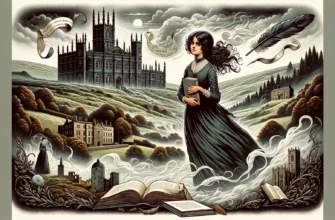‘The Awakening’ Context and Kate Chopin’s Life
Kate Chopin, born Katherine O’Flaherty on February 8, 1850, in St. Louis, Missouri, was an influential figure in 19th-century American literature. Raised in a family of strong women, her mother, Eliza Faris, was of French-Catholic descent, and her father, Thomas O’Flaherty, was an Irish immigrant.
This blend of cultural backgrounds exposed Chopin to diverse perspectives from an early age. Her education at the Sacred Heart Academy after her father’s death in 1855 played a crucial role in shaping her literary voice, providing her with a space to cultivate her thinking and writing skills.
In 1870, Kate married Oscar Chopin, a cotton broker from Louisiana, and moved to New Orleans, a city whose vibrant culture and complexity would later permeate her writing. The couple had six children, and Chopin led a conventional life until her husband’s untimely death in 1882.
Suddenly a widow at 32, Kate took on managing her late husband’s businesses, a challenge that gave her a unique perspective on gender roles and economic independence. Her experience during this time deeply influenced her views on the societal norms and expectations of women, themes that would later become central to her writing.
Despite her tragedies and financial hardships, Chopin began her writing career in the late 1880s, initially publishing short stories in local periodicals. Her work was notable for its focus on the lives of women in Louisiana, their complex relationships, and their struggles within the social constraints of the time.
By delving into these themes, Chopin laid the groundwork for her most famous novel, The Awakening, which would eventually secure her place in the canon of American literature but also bring her much criticism during her lifetime.
‘The Awakening’ by Kate Chopin remains one of the classic novels to read, offering a timeless exploration of identity, freedom, and the complexities of human nature.
Publication and Reception of ‘The Awakening’
‘The Awakening’ was published in 1899, when its themes of female sexuality and personal freedom were considered highly controversial. The novel portrays the emotional journey of Edna Pontellier, a woman who seeks to find her identity beyond the roles of wife and mother that society has imposed on her.
The book’s frank portrayal of these themes led to criticism and moral outrage upon its release. Many contemporary critics condemned the novel for its open discussion of female sexuality and its critique of the societal norms of the time.
Notably, ‘The Awakening’ received harsh criticism from the general public and literary critics. The St. Louis Post-Dispatch, for example, called the novel “poison” and insinuated that it could corrupt the morals of young women. The literary establishment, too, was largely dismissive of the novel’s merits.
The Atlantic Monthly refused to publish the book, and other prominent critics of the time dismissed Chopin’s work as immoral or trivial. This widespread condemnation led to the novel’s commercial failure, and it was largely forgotten after Chopin died in 1904.
However, the latter half of the 20th century saw a revival of interest in Chopin’s work, with scholars and feminists re-evaluating ‘The Awakening‘ as an early feminist text.
Critics began recognizing the novel’s complex exploration of identity, autonomy, and sexuality, praising Chopin’s ahead-of-her-time understanding of these issues. The book was eventually hailed as a pioneering work of early feminism, with its influence and importance acknowledged in literature, gender studies, and beyond.
Edna Pontellier’s Journey
The protagonist of The Awakening, Edna Pontellier, embarks on a journey of self-discovery unprecedented in 19th-century literature. Married to Léonce Pontellier and mother to two children, Edna’s life is outwardly comfortable yet inwardly unfulfilling.
Her awakening begins during a summer at Grand Isle, a resort on the Gulf of Mexico, where she experiences an existential longing for freedom and identity that sets her apart from other women of her time.
Several key events and relationships mark Edna’s transformation. Her friendship with Adèle Ratignolle, the quintessential “mother-woman,” contrasts with her growing sense of individuality and desire for independence.
Simultaneously, her illicit romance with Robert Lebrun ignites a passion within her that challenges the confines of her marriage and societal expectations. Edna’s pursuit of painting, previously a hobby, symbolizes her claim to a self-directed life, representing her rebellion against the domestic roles prescribed to her.
However, Edna’s journey is not without its struggles. As she seeks to reconcile her inner life with the external world, she encounters resistance and misunderstanding from those around her.
Her husband perceives her change as a form of illness or defiance, while society views her actions with disdain and suspicion. Edna’s path is solitary, highlighting the isolation often accompanying the quest for personal authenticity and freedom, especially in a rigid and unaccepting society of women’s autonomy.
Symbolism and Setting in ‘The Awakening’
‘The Awakening’ is replete with symbolism, which Kate Chopin uses to enhance the novel’s themes and deepen the emotional resonance of Edna’s journey. The sea, a constant presence in the story, symbolizes freedom and escape.
It represents Edna’s awakening to her desires and longing to break free from societal constraints. Each time Edna swims in the sea, she experiences a liberation from her prescribed roles and a connection to a deeper, more authentic self.
Birds are another potent symbol in the novel, representing the entrapment and confinement of women in the 19th century. The caged parrot and the mockingbird, introduced at the novel’s beginning, symbolize Edna’s entrapment in her domestic life.
In contrast, the image of a bird with a broken wing at the novel’s conclusion poignantly reflects Edna’s struggles and the difficult realities of seeking personal freedom in an unyielding society.
The settings of New Orleans and Grand Isle are more than mere backdrops; they are integral to the novel’s exploration of Edna’s inner life. The vibrant, multicultural city of New Orleans represents the complex social structures and cultural expectations that Edna navigates daily.
In contrast, Grand Isle offers a space of relative freedom and introspection, allowing Edna to explore her inner desires and question her place in the world. The contrast between these locations mirrors the tension within Edna herself, caught between societal expectations and her burgeoning sense of self.
Themes of Identity and Freedom
‘The Awakening’ is a profound exploration of the themes of identity and freedom, particularly in 19th-century society. Edna Pontellier’s character is a vessel through which Kate Chopin interrogates the confines of societal norms and the struggle for self-realization.
Throughout the novel, Edna grapples with her role as a wife and mother, roles that society deems sacrosanct yet feel alien to her intrinsic sense of self. Her awakening is a testament to the internal conflict many women face who yearn for a sense of identity beyond the domestic sphere.
Chopin deftly portrays the clash between individual desires and societal expectations. As Edna awakens to her wishes and aspirations, she increasingly finds herself at odds with the rigid structures of her society.
The novel does not shy away from the consequences of this clash, depicting Edna’s isolation and misunderstanding as she pursues her path of self-discovery. Chopin’s narrative challenges the reader to consider the cost of personal freedom and the courage required to follow it, particularly in a society that is unyielding in its expectations.
The novel’s portrayal of freedom is multifaceted, encompassing not only the freedom to pursue one’s desires but also the freedom of thought and emotional autonomy. Edna’s awakening is as intellectual and vibrant as it is physical, departing from the traditional literary depiction of women.
Chopin’s exploration of these themes was revolutionary and resonates with readers today, highlighting the universal quest for identity and the right to define one’s existence.
Critical Perspectives on ‘The Awakening’
Since its publication, ‘The Awakening’ has been subject to various critical interpretations, reflecting the evolving discourse on gender, sexuality, and autonomy.
Early critics of the novel, writing at the turn of the 20th century, largely dismissed the book as immoral or insignificant. However, the resurgence of interest in Chopin’s work in the latter half of the 20th century brought a re-evaluation of the novel from multiple critical perspectives.
Feminist critics, particularly, have championed ‘The Awakening’ as an early and proactive exploration of women’s rights and autonomy. They laud Chopin for her unflinching depiction of a woman’s quest for identity and self-fulfillment, even in the face of societal condemnation.
Psychoanalytic critics have delved into the complexities of Edna’s psyche, examining the novel through the lens of identity formation and the human subconscious.
Historical and cultural critics, meanwhile, have contextualized the story within the broader socio-cultural milieu of the late 19th century, examining how the tensions and contradictions of the era are reflected in Chopin’s narrative.
Each perspective offers a unique lens through which to understand ‘The Awakening,’ highlighting the richness of Chopin’s narrative and its capacity to engage with complex, enduring questions about human nature and society.
The diversity of interpretations underscores the novel’s status as a seminal work in American literature that inspires and provokes debate among readers and scholars alike.
‘The Awakening’ in the Context of American Literature
‘The Awakening’ occupies a unique place in the canon of American literature, representing a bridge between the literary movements of Realism and Naturalism.
With its focus on the inner lives of characters and the detailed depiction of their social environments, Chopin’s narrative style aligns with the conventions of Realism. However, her exploration of the darker aspects of human psychology and the deterministic forces of society also resonates with the principles of Naturalism.
In comparing Chopin’s work with that of her contemporaries, one can see both convergences and divergences in thematic and stylistic approaches.
While writers like Mark Twain and Henry James were delving into the complexities of social norms and individual desires, Chopin’s focus on female sexuality and autonomy was groundbreaking.
‘The Awakening’ stands out for its unapologetic portrayal of a woman’s quest for identity, a theme that was largely absent or underexplored in the literature of the time.
Moreover, Chopin’s influence extends beyond her immediate literary context. Her work paved the way for subsequent generations of writers, particularly women writers, who sought to explore the intricacies of female experience and expression.
In this sense, ‘The Awakening’ is not just a product of its time but a catalyst for the broader evolution of American literature, marking a significant contribution to the narrative of human experience and artistic expression.
The Legacy and Relevance of ‘The Awakening’
The legacy of ‘The Awakening’ is as complex and enduring as the novel itself. Initially met with outrage and dismissal, the book has since been embraced as a pioneering work in feminist literature.
Its exploration of themes such as autonomy, identity, and desire continues to resonate with readers and scholars, cementing its status as a classic of American literature. The novel’s relevance extends beyond its historical context, speaking to the universal human experience of seeking meaning and self-realization.
Chopin’s novel has inspired countless writers and artists, influencing diverse works that grapple with the themes of freedom and selfhood. Its impact is evident in literature, film, and the arts, where its themes continue to be explored and reinterpreted.
The novel’s focus on the individual’s struggle against societal norms remains particularly poignant in contemporary discourse, reflecting ongoing debates about gender, sexuality, and identity.
The enduring appeal of ‘The Awakening’ lies in its nuanced portrayal of the human condition and its challenge to the status quo. By presenting a protagonist who defies easy categorization and refuses to conform to societal expectations, Chopin invites readers to reconsider their understanding of freedom and selfhood.
The novel’s legacy is a testament to the power of literature to provoke thought, challenge assumptions, and inspire change, ensuring that ‘The Awakening’ remains a vital and compelling work in the American literary tradition.








